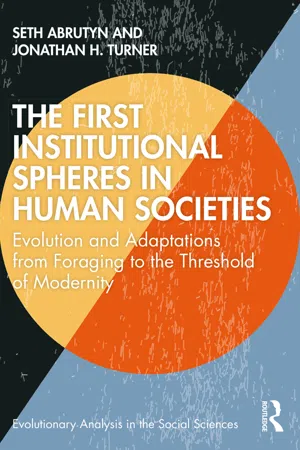
The First Institutional Spheres in Human Societies
Evolution and Adaptations from Foraging to the Threshold of Modernity
- 472 pages
- English
- ePUB (mobile friendly)
- Available on iOS & Android
The First Institutional Spheres in Human Societies
Evolution and Adaptations from Foraging to the Threshold of Modernity
About This Book
Few concepts are as central to sociology as institutions. Yet, like so many sociological concepts, institutions remain vaguely defined. This book expands a foundational definition of the institution, one which locates them as the basic building blocks of human societies—as structural and cultural machines for survival that make it possible to pass precious knowledge from one generation to the next, ensuring the survival of our species. The book extends this classic tradition by, first, applying advances in biological evolution, neuroscience, and primatology to explain the origins of human societies and, in particular, the first institutional sphere: kinship. The authors incorporate insights from natural sciences often marginalized in sociology, while highlighting the limitations of purely biogenetic, Darwinian explanations. Secondly, they build a vivid conceptual model of institutions and their central dynamics as the book charts the chronological evolution of kinship, polity, religion, law, and economy, discussing the biological evidence for the ubiquity of these institutions as evolutionary adaptations themselves.
Frequently asked questions
Information
Table of contents
- Cover
- Endorsement Page
- Half-Title Page
- Series Page
- Title Page
- Copyright Page
- Dedication
- Table of Contents
- Introduction
- 1 On the Origins of Human Capacities
- 2 Selection as the Force Driving Institutional Evolution
- 3 Building Human Institutions
- 4 The Dynamics of Institutional Autonomy
- 5 The First Human Institution: The Evolution of the Nuclear Family and Kinship
- 6 The Elaboration of Kinship
- 7 The Emergence of Polity in Human Societies
- 8 The Increasing Autonomy of Polity
- 9 The Emergence of Religion
- 10 Religious Evolution and Religious Autonomy
- 11 The Emergence of Economy
- 12 The Emergence of Law
- 13 Legal Autonomy and the Expanding Institutional Infrastructure
- 14 Institutional Evolution to the Brink of Modernity
- 15 Institutional Evolution and Stratification
- 16 The Evolved Institutional Order and the West
- Bibliography
- Index